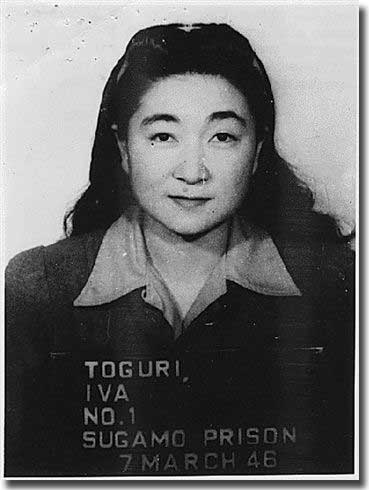"Tokyo Rose" was the name given by Allied forces to a number of English-speaking women who made propaganda radio broadcasts for the Japanese during World War II. One of these women, and the most famous, was Iva Toguri d'Aquino.
Toguri was born in Los Angeles on July 4, 1916. She attended schools in southern California and graduated from UCLA in 1940 with a degree in zoology. During her school years Toguri was a popular student and was considered a loyal American.
In 1941 she sailed to Japan without a U.S. passport, supposedly to visit a sick aunt and to study medicine. A few months later Toguri went to the U.S. Vice Consul in Japan to get a passport, saying that she wanted to return to America for permanent residence. Because she had no passport, her application was forwarded to the State Department for consideration. But before anything would happen, Japan attacked the U.S. and war was declared. Toguri dropped her request and stayed in Japan, landing jobs as a typist in news organizations, one of which was Radio Tokyo. In November 1943 she became a broadcaster for Radio Tokyo on a show called The Zero Hour, where she was introduced to the program as "Orphan Anne." During her tenure she played the popular music of the day and announced a summary of the news. The Army stated that the program had no negative effects on troop morale, and that it might have even raised it a bit. They did, however, express concern that Annie knew a little too much about American ship and troop movements. It was during this time that she married Felipe Aquino, a Portuguese citizen of Japanese-Portuguese ancestry.
In November 1943 she became a broadcaster for Radio Tokyo on a show called The Zero Hour, where she was introduced to the program as "Orphan Anne." During her tenure she played the popular music of the day and announced a summary of the news. The Army stated that the program had no negative effects on troop morale, and that it might have even raised it a bit. They did, however, express concern that Annie knew a little too much about American ship and troop movements. It was during this time that she married Felipe Aquino, a Portuguese citizen of Japanese-Portuguese ancestry.
In September 1945 the Army arrested Toguri after she had been outed by the press as "Tokyo Rose." The FBI and the Army’s Counterintelligence Corps conducted an investigation but decided there was not enough for prosecution, and released her a year later. Toguri again asked for a U.S. passport. This created a media frenzy which put pressure on the Justice Department to take matters further. To make a long story short: the trial was a sham. The U.S. government forced Toguri's former bosses at Radio Tokyo to lie under oath against her. The costliest trial in American history at that time (over $500,000), Toguri faced eight "overt acts" of treason in the Federal District Court in San Francisco on July 5, 1949. On September 29 she was found guilty of one act. The jury ruled that
...on a day during October, 1944, the exact date being to the Grand Jurors unknown, said defendant, at Tokyo, Japan, in a broadcasting studio of the Broadcasting Corporation of Japan, did speak into a microphone concerning the loss of ships.
On October 6 Toguri was sentenced to ten years in prison and fined $10,000. She served six years and two months, then moved to Chicago. On his last day in office in 1977, President Ford pardoned her.
Iva Toguri died on September 26, 2006, at the age of 90.


0 comments:
Post a Comment